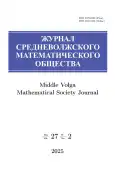A Study of Numerical Methods for Solving the Nonlinear Energy Resources Supply-Demand System
- Autores: Vo V.T.1, Noeiaghdam S.2, Dreglea A.I.1, Sidorov D.N.1
-
Afiliações:
- Irkutsk National Research Technical University
- Irkutsk National Research Technical University, Institute of Mathematics, Henan Academy of Sciences
- Edição: Volume 27, Nº 2 (2025)
- Páginas: 143-170
- Seção: Mathematics
- ##submission.datePublished##: 28.05.2025
- URL: https://journal-vniispk.ru/2079-6900/article/view/324412
- DOI: https://doi.org/10.15507/079-6900.27.202502.143-170
- ID: 324412
Citar
Texto integral
Resumo
n this study, we implement and estimate various numerical methods for solving a nonlinear differential equation system modeling energy resources supply-demand dynamics. Both single-step methods (Taylor series, Runge-Kutta) and multi-step methods (Adams – Bashforth, Adams Predictor-Corrector) are employed. In addition to standard fourth-order methods, higher-order techniques such as the fifth-order Runge-Kutta method and the sixth- order Taylor series method are also applied. Furthermore, along with fixed-step numerical methods, we implement and assess adaptive step-size methods, including the explicit Runge- Kutta method of order 5(4) (that is RK45), the explicit Runge-Kutta method of order 8(5,3) (or DOP853), the implicit Runge-Kutta method from the Radau IIA family of order 5 (Radau), the implicit method based on backward differentiation formulas (BDF), and the Adams/BDF method with automatic switching (LSODA). The results indicate that, in the cases we considered, single-step methods are more effective than multi-step ones in capturing and tracking rapid variations of the system, while multi-step methods require less computation time. Adaptive step-size numerical methods demonstrate both flexibility and stability. Through the evaluation and analysis of numerical solutions obtained by various methods, the behaviour and dynamic characteristics of the system are explored.
Sobre autores
Van Vo
Irkutsk National Research Technical University
Email: votruong.90@gmail.com
ORCID ID: 0009-0008-2701-4775
PhD Student, Irkutsk National Research Technical University
Rússia, 83, Lermontov St., Irkutsk 664074, RussiaSamad Noeiaghdam
Irkutsk National Research Technical University, Institute of Mathematics, Henan Academy of Sciences
Email: snoei@hnas.ac.cn
ORCID ID: 0000-0002-2307-0891
Ph.D. (Phys. and Math.), Professor, Institute of Mathematics, Henan Academy of Sciences
República Popular da ChinaAliona Dreglea
Irkutsk National Research Technical University
Email: adreglea@gmail.com
ORCID ID: 0000-0002-5032-0665
Ph.D. (Phys. and Math.), Associate Professor, Senior Researcher, Scientific Research Department
Rússia, 83 Lermontov St., Irkutsk 664074, RussiaDenis Sidorov
Irkutsk National Research Technical University
Autor responsável pela correspondência
Email: dsidorov@isem.irk.ru
ORCID ID: 0000-0002-3131-1325
D. Sc. (Phys. and Math.), Professor, Chief Researcher, Applied Mathematics Department
Rússia, 83, Lermontov St., Irkutsk 664074, RussiaBibliografia
- L. E. Elsgolts, Differential Equations and the Calculus of Variations, Nauka, Moscow, Russia, 1965 (In Russ.), 424 p.
- N. Sidorov, D. Sidorov, Y. Li, "Basins of Attraction and Stability of Nonlinear Systems' Equilibrium Points", Differential Equations and Dynamical Systems, 31:2 (2023), 289–300. doi: 10.1007/s12591-019-00511-w
- M. Sun, L. Tian, Y. Fu, "An energy resources demand–supply system and its dynamical analysis", Chaos Solitons and Fractals, 32:1 (2007), 168–180. doi: 10.1016/j.chaos.2005.10.085
- M. Sun, Q. Jia, L. Tian, "A new four-dimensional energy resources system and its linear feedback control", Chaos Solitons and Fractals, 39:1 (2007), 101–108. doi: 10.1016/j.chaos.2007.01.125
- M. Sun, L. Tian, Q. Jia, "Adaptive control and synchronization of a four-dimensional energy resources system with unknown parameters", Chaos Solitons and Fractals, 39:4 (2009), 1943–1949. doi: 10.1016/j.chaos.2007.06.117
- C. Vuik, F. J. Vermolen, M. B. van Gijzen, M. J. Vuik, Numerical Methods for Ordinary Differential Equations, TUDelft, Netherlands, 2023 doi: 10.5074/t.2023.001, 125 p.
- M. Sun, Y. Tao, X. Wang, L. Tian, "The model reference control for the fourdimensional energy supply-demand system", Applied Mathematical Modelling, 35:10 (2011), 5165–5172. doi: 10.1016/j.apm.2011.04.016
- C.-F. Huang, K.-H. Cheng, J.-J. Yan, "Robust chaos synchronization of four-dimensional energy resource systems subject to unmatched uncertainties", Communications in Nonlinear Science and Numerical Simulation, 14:6 (2009), 2784–2792. doi: 10.1016/j.cnsns.2008.09.017
- V. T. Vo, S. Noeiaghdam, D. Sidorov, A. Dreglea, L. Wang, "Solving Nonlinear Energy Supply and Demand System Using Physics-Informed Neural Networks", Computation, 13:1 (2025), 13. doi: 10.3390/computation13010013
- S. R. K. Iyengar, R. K. Jain, Numerical Methods, New Age International Publishers, New Delhi, 2009, 315 p.
- J. R. Dormand, P. J. Prince, "A Family of Embedded Runge-Kutta Formulae", Journal of Computational and Applied Mathematics, 6 (1980), 19–26. doi: 10.1016/0771-050X(80)90013-3
- L.W. Shampine, "Some Practical Runge-Kutta Formulas", Mathematics of Computation, 46 (1986), 135150.
- E. Hairer, S. P. Norsett, G. Wanner, Solving Ordinary Differential Equations I: Nonstiff Problems, Springer, Berlin Heidelberg, 2008 doi: 10.1007/978-3-540-78862-1, 528 p.
- E. Hairer, G. Wanner, Solving Ordinary Differential Equations II: Stiff and Differential-Algebraic Problems, Springer, Berlin Heidelberg, 2002, 614 p.
- G. D. Byrne, A. C. Hindmarsh, "A polyalgorithm for the numerical solution of ordinary differential equations", ACM Transactions on Mathematical Software, 1:1 (1975), 71–96. doi: 10.1145/355626.355636
- L. Petzold, "Automatic selection of methods for solving stiff and nonstiff systems of ordinary differential equations", SIAM Journal on Scientific and Statistical Computing, 4:1 (1983), 136–148. doi: 10.1137/0904010
- E. Ayars, Computational Physics With Python, California State University, Chico, California, 2013, 186 p.
- SciPy Reference, SciPy Documentation. URL: https://docs.scipy.org/doc/scipy/ reference/integrate.html, 2025, (Date of access: 03.02.2025).
- J. C. Butcher, Numerical Methods for Ordinary Differential Equations, John Wiley & Sons Ltd, England, 2008, 463 p.
- S. C. Chapra, R. P. Canale, Numerical Methods for Engineers, eighth edition, McGrawHill Education, New York, 2021, 988 p.
- K. Novak, Numerical Methods for Scientific Computing, Equal Share Press, Virginia, 2022, 706 p.
Arquivos suplementares










